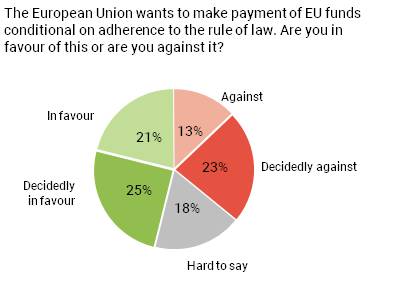42/2020
2020-12-28
Conditionality and the EU Budget
The leaders of the EU countries have reached agreement on the subject of linking payouts of EU funds to the rule of law. Although the question of applying conditionality mechanisms and the consequences for Poland are hard for public opinion to assess, in the last few weeks Polish people have had the opportunity to hear arguments for and against in the context of fears of losing sovereignty, on the one hand, and the spectre of Polexit, on the other.
Opinions are divided on the subject of making payouts of EU funds conditional on adherence to the rule of law, however more people are in favour of introducing conditionality mechanisms (46%) than are opposed (36%).

|
Over half (52%) of people who support Poland’s membership of the EU are in favour of linking payouts of EU funds to the rule of law. The majority of opponents of Poland’s membership are against this (73%).
Conditionality is supported by 74% of respondents who think that EU membership does not overly limit Poland’s sovereignty. On the other hand, a majority (74%) of those who believe that EU membership does limit Poland’s sovereignty are opposed to linking payouts of EU funds to the rule of law.
More on this subject in the CBOS report.
This ‘Current Events and Problems’ survey (367) was conducted using a mixed-mode procedure on a representative sample of named adult residents of Poland, randomly selected from the National Identity Number (PESEL) register.
Respondents independently selected one of the following methods:
– Computer Assisted Personal Interview (CAPI);
– Computer Assisted Telephone Interview (CATI), respondents receiving researchers’ telephone numbers in an introductory letter from CBOS;
– Computer Assisted Web Interview (CAWI), where respondents filled in the online questionnaire independently, gaining access by means of a login and password provided in an introductory letter from CBOS.
– Computer Assisted Personal Interview (CAPI);
– Computer Assisted Telephone Interview (CATI), respondents receiving researchers’ telephone numbers in an introductory letter from CBOS;
– Computer Assisted Web Interview (CAWI), where respondents filled in the online questionnaire independently, gaining access by means of a login and password provided in an introductory letter from CBOS.
In all three cases the questionnaire had the same structure and comprised the same questions. The survey was carried out between 30 November and 10 December 2020 inclusive on a sample of 1010 people (42.2% using the CAPI method, 44% CATI and 13.9% CAWI).
CBOS has been conducting statutory research using the above procedure since May 2020, stating in each case the percentage of personal, telephone and internet interviews.





